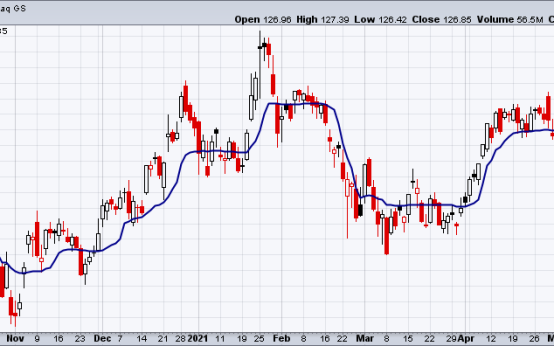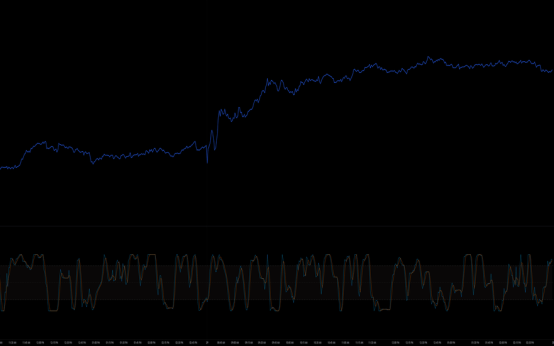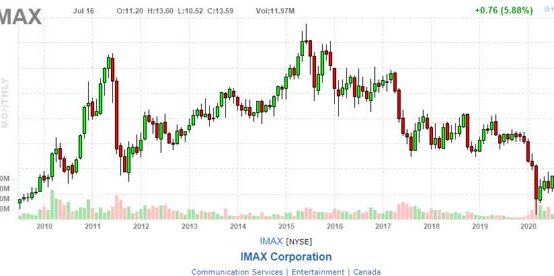iShares, Inc. – iShares MSCI Taiwan ETF (ARCA:EWT) has a Value Composite score of 50. Developed by James O’Shaughnessy, the VC score uses six valuation ratios. These ratios are price to earnings, price to cash flow, EBITDA to EV, price to book value, price to sales and shareholder yield. The VC score is displayed as a number between 1 and 100. In general, a company with a score closer to 0 would be seen as undervalued, and a score closer to 100 would indicate an overvalued company. Removing the sixth ratio (shareholder yield) we can view the Value Composite 1 score which is currently sitting at 63.
Investing in the stock market can sometimes be a wild ride. Without the proper planning and research, investors may quickly find themselves on the outside looking in. Doing the research and studying the market can be helpful, but creating a trading or investing plan may be the most important part of the process. When the back testing and practice is completed, the real challenge awaits. The practice and preparation can be very helpful for understanding the market, but when real money gets put on the line, it can be a whole different ballgame. The more successful traders and investors are the ones who are able to stay focused and disciplined even throughout turbulent market situations.
At the time of writing, iShares, Inc. – iShares MSCI Taiwan ETF (ARCA:EWT) has a Piotroski F-Score of 4. The F-Score may help discover companies with strengthening balance sheets. The score may also be used to spot the weak performers. Joseph Piotroski developed the F-Score which employs nine different variables based on the company financial statement. A single point is assigned to each test that a stock passes. Typically, a stock scoring an 8 or 9 would be seen as strong. On the other end, a stock with a score from 0-2 would be viewed as weak.
Watching some historical volatility numbers on shares of iShares, Inc. – iShares MSCI Taiwan ETF (ARCA:EWT), we can see that the 12 month volatility is presently 17.924600. The 6 month volatility is 17.337200, and the 3 month is spotted at 15.297500. Following volatility data can help measure how much the stock price has fluctuated over the specified time period. Although past volatility action may help project future stock volatility, it may also be vastly different when taking into account other factors that may be driving price action during the measured time period.
Shifting gears, we can see that iShares, Inc. – iShares MSCI Taiwan ETF (ARCA:EWT) has a Q.i. Value of 53.00000. The Q.i. Value ranks companies using four ratios. These ratios consist of EBITDA Yield, FCF Yield, Liquidity, and Earnings Yield. The purpose of the Q.i. Value is to help identify companies that are the most undervalued. Typically, the lower the value, the more undervalued the company tends to be.
iShares, Inc. – iShares MSCI Taiwan ETF (ARCA:EWT) has a current MF Rank of 9639. Developed by hedge fund manager Joel Greenblatt, the intention of the formula is to spot high quality companies that are trading at an attractive price. The formula uses ROIC and earnings yield ratios to find quality, undervalued stocks. In general, companies with the lowest combined rank may be the higher quality picks. iShares, Inc. – iShares MSCI Taiwan ETF has a current ERP5 Rank of 9037. The ERP5 Rank may assist investors with spotting companies that are undervalued. This ranking uses four ratios. These ratios are Earnings Yield, ROIC, Price to Book, and 5 year average ROIC. When looking at the ERP5 ranking, it is generally considered the lower the value, the better.
iShares, Inc. – iShares MSCI Taiwan ETF has an M-score Beneish of -999.000000. This M-score model was developed by Messod Beneish in order to detect manipulation of financial statements. The score uses a combination of eight different variables. The specifics of the variables and formula can be found in the Beneish paper “The Detection of Earnings Manipulation”.
Investors may be interested in viewing the Gross Margin score on shares of iShares, Inc. – iShares MSCI Taiwan ETF (ARCA:EWT). The name currently has a score of 8.00000. This score is derived from the Gross Margin (Marx) stability and growth over the previous eight years. The Gross Margin score lands on a scale from 1 to 100 where a score of 1 would be considered positive, and a score of 100 would be seen as negative.
We can now take a quick look at some historical stock price index data. iShares, Inc. – iShares MSCI Taiwan ETF (ARCA:EWT) presently has a 10 month price index of 0.89076. The price index is calculated by dividing the current share price by the share price ten months ago. A ratio over one indicates an increase in share price over the period. A ratio lower than one shows that the price has decreased over that time period. Looking at some alternate time periods, the 12 month price index is 0.90793, the 24 month is 0.99328, and the 36 month is 1.31813. Narrowing in a bit closer, the 5 month price index is 1.02625, the 3 month is 0.97741, and the 1 month is currently 0.90541.
As many investors probably already know, there is no one way to select winning stocks. There are plenty of different theories and ideas out there, and it may become overwhelming to look at all of them. Individual investors who manage their own money may have to dedicate an ample amount of time to find a strategy that works for them. Understanding portfolio diversification, personal risk tolerance, and time horizon may be a good place for the investor to start. Because there is no guarantee that past performance will indicate future results, investors may have to be willing to come at the market from a few different angles.
|
Just-released report names Cannabis Stock of the Year for 2019! Their last pick has seen a +1,200% return since he released it! This stock has all of the makings of the next great cannabis stock – early-mover advantage, international exposure and influential partnerships, plus it has a product that is unlike anything else on the market… |
Developed by James O’Shaughnessy, the Value Composite score uses six valuation ratios. These ratios are price to earnings, price to cash flow, EBITDA to EV, price to book value, price to sales and shareholder yield. Royal Caribbean Cruises Ltd. (NYSE:RCL) has a Value Composite score of 29. The VC score is displayed as a number between 1 and 100. In general, a company with a score closer to 0 would be seen as undervalued, and a score closer to 100 would indicate an overvalued company. Removing the sixth ratio (shareholder yield) we can view the Value Composite 1 score which is currently sitting at 36.
Doing standard fundamental stock analysis is fairly straightforward. These days, investors have easy access to large amounts of available data. The biggest problem for the average investor may be dedicating the time to actually doing the research. One goal of studying the fundamentals is to establish the true value of a stock compared to how it is currently trading in the marketplace. Many investors believe that identifying quality stocks should be a cornerstone of portfolio construction. Obtaining as much knowledge as possible about a stock can help make the buying decisions a little easier. Some investors may trust other people or products to do the required research, but others may wish to roll up the sleeves and do all the analysis themselves.
Shifting gears, we can see that Royal Caribbean Cruises Ltd. (NYSE:RCL) has a Q.i. Value of 35.00000. The Q.i. Value ranks companies using four ratios. These ratios consist of EBITDA Yield, FCF Yield, Liquidity, and Earnings Yield. The purpose of the Q.i. Value is to help identify companies that are the most undervalued. Typically, the lower the value, the more undervalued the company tends to be.
Royal Caribbean Cruises Ltd. (NYSE:RCL) has a current MF Rank of 7700. Developed by hedge fund manager Joel Greenblatt, the intention of the formula is to spot high quality companies that are trading at an attractive price. The formula uses ROIC and earnings yield ratios to find quality, undervalued stocks. In general, companies with the lowest combined rank may be the higher quality picks. Royal Caribbean Cruises Ltd. has a current ERP5 Rank of 9128. The ERP5 Rank may assist investors with spotting companies that are undervalued. This ranking uses four ratios. These ratios are Earnings Yield, ROIC, Price to Book, and 5 year average ROIC. When looking at the ERP5 ranking, it is generally considered the lower the value, the better.
Valuation Scores
At the time of writing, Royal Caribbean Cruises Ltd. (NYSE:RCL) has a Piotroski F-Score of 7. The F-Score may help discover companies with strengthening balance sheets. The score may also be used to spot the weak performers. Joseph Piotroski developed the F-Score which employs nine different variables based on the company financial statement. A single point is assigned to each test that a stock passes. Typically, a stock scoring an 8 or 9 would be seen as strong. On the other end, a stock with a score from 0-2 would be viewed as weak.
Royal Caribbean Cruises Ltd. has an M-score Beneish of -2.630567. This M-score model was developed by Messod Beneish in order to detect manipulation of financial statements. The score uses a combination of eight different variables. The specifics of the variables and formula can be found in the Beneish paper “The Detection of Earnings Manipulation”.
Investors may be interested in viewing the Gross Margin score on shares of Royal Caribbean Cruises Ltd. (NYSE:RCL). The name currently has a score of 14.00000. This score is derived from the Gross Margin (Marx) stability and growth over the previous eight years. The Gross Margin score lands on a scale from 1 to 100 where a score of 1 would be considered positive, and a score of 100 would be seen as negative.
Watching some historical volatility numbers on shares of Royal Caribbean Cruises Ltd. (NYSE:RCL), we can see that the 12 month volatility is presently 31.063300. The 6 month volatility is 32.002200, and the 3 month is spotted at 25.456300. Following volatility data can help measure how much the stock price has fluctuated over the specified time period. Although past volatility action may help project future stock volatility, it may also be vastly different when taking into account other factors that may be driving price action during the measured time period.
We can now take a quick look at some historical stock price index data. Royal Caribbean Cruises Ltd. (NYSE:RCL) presently has a 10 month price index of 1.11600. The price index is calculated by dividing the current share price by the share price ten months ago. A ratio over one indicates an increase in share price over the period. A ratio lower than one shows that the price has decreased over that time period. Looking at some alternate time periods, the 12 month price index is 1.17407, the 24 month is 1.14815, and the 36 month is 1.66178. Narrowing in a bit closer, the 5 month price index is 1.25279, the 3 month is 1.03401, and the 1 month is currently 1.00719.
Investors might be preparing to do a portfolio evaluation as we move towards the close of the year. There may be plenty of big winners from the first half of the year, but there may also be some underperformers that need to be reviewed. Making sure that the portfolio stays in balance can help prepare the investor for success over the next few quarters. With the stock market still riding high, investors may be wondering how to play the market into the near future. If market momentum starts to shift, investors may need to be ready to make some tougher decisions. Being prepared for any market situation can help the investor cope with rough waters when the time comes.
 Kaufman Adaptive Moving Average Trending Up for Federal Signal Corp (FSS)
Kaufman Adaptive Moving Average Trending Up for Federal Signal Corp (FSS)  Checking on the Valuation For Shares of Zymeworks Inc. (TSX:ZYME), Talend S.A. (NasdaqGM:TLND)
Checking on the Valuation For Shares of Zymeworks Inc. (TSX:ZYME), Talend S.A. (NasdaqGM:TLND)  Consensus EPS Watch for Royal Caribbean Cruises Ltd. (NYSE:RCL)
Consensus EPS Watch for Royal Caribbean Cruises Ltd. (NYSE:RCL)  Estimates in Focus for Shares of Royal Caribbean Cruises Ltd. (NYSE:RCL)
Estimates in Focus for Shares of Royal Caribbean Cruises Ltd. (NYSE:RCL)  Caribbean Holdings International Corp (CBBI): Watching the Stochastic RSI on This Stock
Caribbean Holdings International Corp (CBBI): Watching the Stochastic RSI on This Stock  Signal Update on Shares of Imax Corp (IMAX): Weighted Alpha Hits -3.90
Signal Update on Shares of Imax Corp (IMAX): Weighted Alpha Hits -3.90